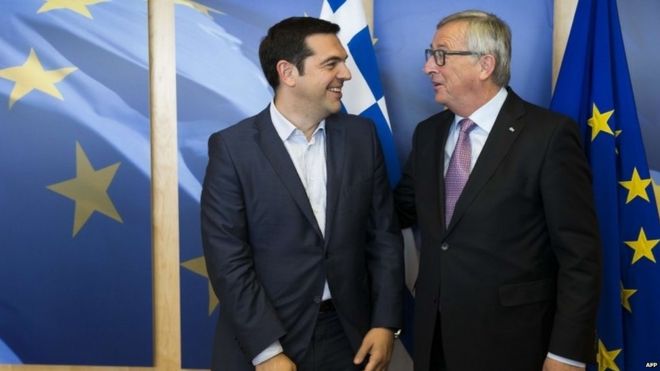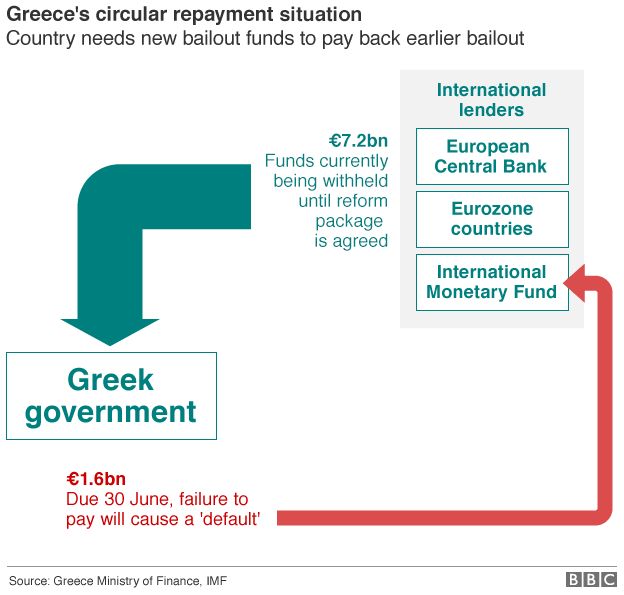
Greek Prime Minister Alexis Tsipras has criticised Greece’s international creditors for failing to accept his government’s latest reform proposals.
He said this never occurred with similar measures put forward by other states negotiating bailouts, suggesting creditors might not want a deal.
There are also reports that Greece has rejected an IMF counter-proposal seeking more pension and spending cuts.
Mr Tsipras’ remarks came as he prepared for fresh talks to secure a debt deal.
Greece must repay €1.6bn (£1.1bn) to the International Monetary Fund (IMF) by the end of the month, or face default and possible exit from the EU.
Eurozone finance ministers are due to finalise a deal on Wednesday evening.
On Wednesday, the ECB again increased additional emergency funding for Greek banks to stave off fears of a bank run – the fifth time in eight days it has done so as fearful savers withdraw up to €1bn a day from domestic banks.

Greek pensioners fear being hit further by austerity measures
Only once agreement is reached will creditors unlock the final €7.2bn tranche of bailout funds.
The agreement being formed is believed to include:
- New taxes on businesses and the wealthy
- Selective increases in VAT
- Savings in pensions linked to curbing early retirement and increasing pension contributions
- No further reductions in pensions or public-sector wages – “red lines” for Greece’s Syriza government
Mr Tsipras is to meet the European Commission, the European Central Bank (ECB) and the International Monetary Fund (IMF) – the trio evaluating his proposals.
They are hoping to finalise a deal that would release further loans to Greece before it runs out of money.
Tight schedule – the week ahead
- Wednesday: Eurozone’s 19 finance ministers meet to go through details of latest proposals
- Thursday-Friday: Scheduled meeting of all 28 EU member states – any agreement could receive leaders’ backing here
- Saturday-Tuesday: Agreement will need to be approved by Greek parliament and other eurozone governments – including vote in German Bundestag
- Tuesday 30 June: Deadline for Greek repayment of €1.6bn to IMF
Peston: End of an act in tragedy
How did Greece get in this mess?
The Greek government has put forward budget proposals that it says meet the targets demanded by its creditors.
But the BBC’s Chris Morris in Brussels says they include far more tax rises and far fewer spending cuts than its creditors had suggested, and the IMF in particular is refusing to accept them.
This prompted Mr Tsipras to tweet: “The repeated rejection of equivalent measures by certain institutions never occurred before – neither in Ireland nor Portugal.
“This odd stance seems to indicate that either there is no interest in an agreement or that special interests are being backed.”
Our correspondent says he appears to be alluding to fears that there are those elsewhere in the Eurozone who want to put the Greek Prime Minister in an impossible position, and engineer the collapse of his radical left-wing government.
There are also reports that Greece has rejected an IMF counter-proposal calling for bigger VAT increases, and deeper pension and public spending cuts.
Finance Minister Yanis Varoufakis’s spokesman Dimitris Yannopoulos tweeted: “IMF stance has changed: Now says GR debt sustainable if pensions (& wages) squeezed to unsustainably low levels. Shock Doctrine”
If agreement is reached, it will have to be endorsed by Greece’s parliament, with some critics at home accusing the left-wing prime minister of reneging on his party’s campaign pledge to end austerity.

BBC
 Q FM Africa's Modern Radio
Q FM Africa's Modern Radio